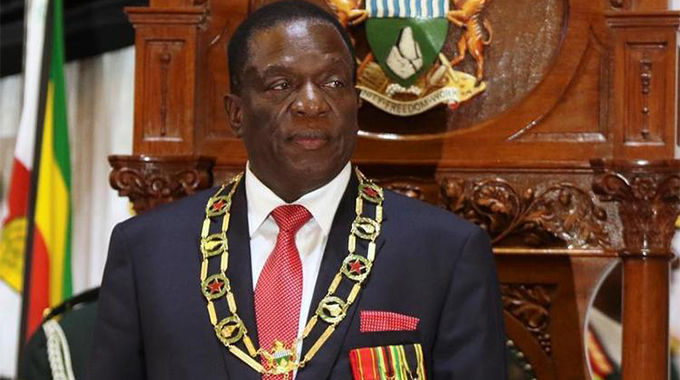Political legitimacy and transformative justice

It might seem a monumental task for any newly elected government to deal expeditiously with issues of political legitimacy and the rebuilding of public trust. For President Mnangagwa’s administration, the establishment of a Commission of Inquiry (COI) into the post-election deaths of civilians who were shot by soldiers seems to be a keyhole into legitimacy.
While the Constitutional Court ruling affirmed President Mnangagwa as the winner of the July 30 elections, the opposition MDC Alliance is still not recognising the legitimacy of the Mnangagwa presidency after having approached the Banjul Commission.
In his inauguration speech, President Mnangagwa indicated that he was going to establish a COI into the shootings that led to the death of more than six civilians. Most importantly, he also indicated that he would ensure that the findings of such a commission are published.
The publication of the findings is very important for transformative justice for two reasons.
First, it affirms the newness of Zimbabwe’s transformation. Zimbabwe once established the Chihambakwe Commission of Inquiry into the Gukurahundi disturbances that occurred in the 1980s.
Its findings were not published notwithstanding that between 10 000 and 20 000 victims died. The victims, their families, researchers and the Zimbabwean society only relied on the findings of the Catholic Commission for Justice and Peace and Legal Resources Foundation.
Secondly, there is need for political will in promoting independent decision-making in political governance. The civilian deaths are matters of public concern and it is indeed in the interest of the public for the President to demonstrate that political expediency will not be used to violate the principles of governance espoused by our Constitution which include the four principles of transparency, accountability, responsiveness and justice.
If the principles raised in this article are neglected, as they have been in the Gukurahundi disturbances, the human cost to peace-building, the rule of law, transitional justice and the victims of the shootings will be severe.
Fortunately, the President has demonstrated that he wants the commission to reveal its findings. What remains is the establishment of the COI.
It is therefore important that the independence of the commissioners and their terms of reference be framed in a manner that promotes realisation of transformative justice.
It must be noted that the presidium or the executive arm of the State in any polity is often accused of exercising its powers behind a veil of secrecy and deceit. It is usually the case that the general citizenry is inclined to consuming executive promises with a lot of scepticism.
It is also generally accepted that the general populace wants the Government to limit the excesses of its executive powers.
A government which is willing to establish middle-course organisations to check its activities slowly earns trust from its citizens. It is often said that “respect is earned and not demanded”. Mutual trust and respect are built up and rebuilt gradually.
It is generally understood that COIs offer a good picture of the realities of domestic affairs, and in the current political climate where the issue of political authority and political legitimacy are under a plumb line, President Mnangagwa’s domestic policy must earn the citizens’ trust.
This article interprets the establishment of a COI as a key factor that determines whether or not the three pillars of the State: Executive, Judiciary and Legislature can support each other during this five-year governance cycle.
We shall see how the Judiciary and the Legislature may be called to look into the President’s decision and the COI’s operations and findings.
It is argued in this article that the State institutions and citizens must give peace and peace-building efforts a chance to flourish.
While the main political parties, ZANU-PF and MDC Alliance, may still be engaged in the fight for political legitimacy at the moment, it is important for them to encourage their supporters to shun a culture of hate speech so that real peace and transformative justice can be realised.
The media, civil society organisations and academic institutions must examine closely the independence of the anticipated commission.
Revelations from such platforms must be accepted by the Executive and should inform how it selects the commissioners and how it sets timelines for the inquiry to be completed and for the findings to be published.
While political perfidy may not be ruled out in any appointment process, promptness in preparing the legal apparatus of the anticipated commission can strengthen the system of accountability in Zimbabwe.
Further, it dispenses allegations that a specific Government process will be a sham.
In the end, the COI’s findings may help answer pertinent questions on what motivated the shootings, who ordered the shooting, whether or not there was command responsibility and so forth.
Then the result will follow the cause. The courts, independent institutions and Parliament may be involved if there are recommendations for prosecution of alleged perpetrators or legal reform into the statutory roles of security institutions and the presidency.
The rights of protesters and their responsibilities in terms of the law will also be weighed in light of the findings. Genuine apologies and reparations from Government, security institutions or political parties involved can then be made.
In establishing the commission, Government must also work with organisations that are involved in peace-building and healing such as Heal Zimbabwe Trust, Counselling and Services Unit, the Zimbabwe Catholic Bishops’ Conference and so forth with a view of embedding a holistic approach to peace-building and reconciliation in Zimbabwe.
Consequently, the roll of honour that comes after collaboration will never be forgotten now and in the future.
Sharon Hofisi is a lecturer in administrative law. Feedback: [email protected]










Comments